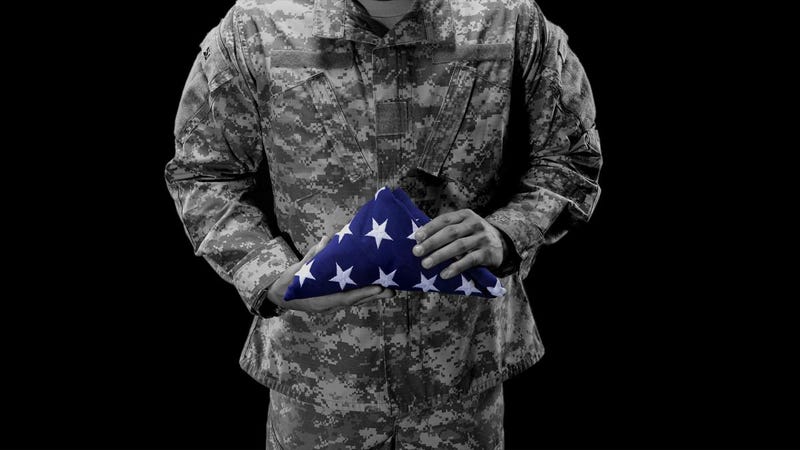
An annual report from the Department of Veterans Affairs has found that the number of veteran suicides decreased from 2018 to 2019.
"Although VA is heartened that 399 fewer veterans died by suicide in 2019 compared to 2018, VA is poignantly and painfully mindful that 6,261 Veterans died by suicide in 2019," the report reads. "While the differential in adjusted suicide rates between veterans and non-veterans decreased from its high of being 66.3% greater in 2017, the fact remains that veterans in 2019 reflected a suicide rate 52.3% higher than non-veterans in the U.S."
This latest report provides the most comprehensive data to date regarding suicide among U.S. veterans from 2001-2019.
In 2019, the veteran suicide rate was 31.6 per 100,000, substantially higher than the rate among non-veteran U.S. adults, which is 16.8 per 100,000.
Adjusting for age-and-sex differences, the suicide rate among veterans in 2019 was 52.3% higher than for non-veteran U.S. adults, the report found. The suicide rate difference between veterans and the non-veteran U.S. population was highest in 2017 at 66.3%.
From 2018 to 2019, there was a 7.2% overall decrease in the age- and sex-adjusted veteran suicide mortality rate in 2019, while among non-veteran U.S. adults, the adjusted suicide mortality rate fell by 1.8%.
The age-adjusted suicide rate for male veterans decreased 3.8% in 2019 from 2018 while the age-adjusted suicide rate for female veterans decreased 14.9% in 2019 from 2018.

Firearms were more often involved in veteran suicides in 2019 than in 2018 (among veteran men who died from suicide: 69.6% in 2018, 70.2% in 2019; among veteran women who died from suicide: 41.1% in 2018, 49.8% in 2019).
“Suicide prevention remains a top priority for VA, with the most significant amount of resources ever appropriated and apportioned to VA suicide prevention,” said VA Secretary Denis McDonough. “Suicide is preventable, and everyone has a role to play in saving lives.”
September is also recognized as suicide prevention month.
“Suicide prevention month really gives us the opportunity to engage communities in veteran suicide prevention,” said Dr. Matthew Miller, the director of the National VA Suicide Prevention Program.
The theme for the month is Reach Out, and encourages veterans and their loved ones to not wait until a crisis happens but to reach out now.
“We know that reaching out to veterans, veterans reaching out to veterans really can make a meaningful difference in how they feel about their life and how they are supported in that life,” he said.
Miller said it can be a scary thought to reach out to someone and then have them tell them they are thinking of taking their own life.
“It’s important to realize that one of the greatest myths and one of the most dangerous myths about suicide is if you ask somebody if they are planning on harming themselves, you will give them the idea and they will act on that,” he said.
Miller said both evidence and decades of research prove that is not the case.
“In fact, there are lots of survivor stories where it’s very clear that if just one person had asked them how they were doing, it would have made a difference,” he said.
Miller said that’s one of the reasons that VA has adopted screening for suicide risk across its entire health care system.
“We’re asking people about their intent and what they’re thinking and feeling long before they get to a point where they’re expressing an intent to act,” he said. “If you ask, that’s the single best opportunity you have for saving that person’s life and making a difference for them.”
Miller said that so far, VA has not observed increases in documented suicide-related during the COVID-19 pandemic. VA will examine suicide mortality when national death certificate data becomes available.
‘We’re still in this COVID pandemic, so it’s early, but there is some evidence that showed suicidal ideations actually went down during COVID,” he said.
Miller noted that special surveillance was set up across the Veterans Health Administration that looked specifically at both suicide behaviors and attempts during the pandemic.
“While it will still be a little while before we have data on that, the data so far actually indicated that suicide attempts and deaths are actually down during COVID,” he said.
If you or someone you know is having thoughts of suicide, contact the Veterans Crisis Line to receive free, confidential support and crisis intervention available 24 hours a day, 7 days a week, 365 days a year. Call 1-800-273-8255 and Press 1, text 838255 or chat online here.
Reach Julia LeDoux at Julia@connectingvets.com.
Want to get more connected to all the news and resources Connecting Vets has to offer? Click here for our weekly newsletter.



